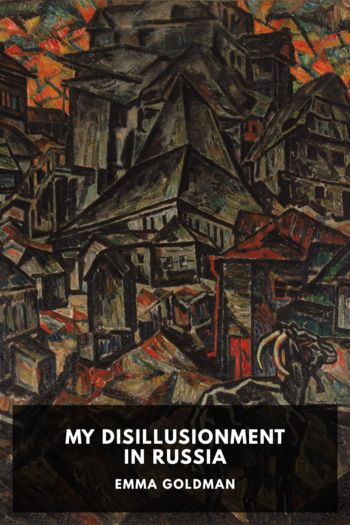Journey from St. Petersburg to Moscow Irina Reyfman (snow like ashes .TXT) 📖

- Author: Irina Reyfman
Book online «Journey from St. Petersburg to Moscow Irina Reyfman (snow like ashes .TXT) 📖». Author Irina Reyfman
These were my thoughts as I drove up to Novgorod, looking at the many monasteries situated around it.
They say that all these monasteries, even those located at a distance of fifteen versts* from the city, were enclosed within; that from its walls up to one hundred thousand troops could exit. It is known from the chronicles that Novgorod had a democratic government.44 Whilst they had princes, their power was scant. The power of administration was vested in the mayors and the military commanders.45 The people, assembled in the veche,46 was the true ruler. The province of Novgorod extended north even farther than the Volga. This free state was a member of the Hanseatic League. The old saying: “Who can stand up to God and Novgorod the Great?” serves as proof of its might. Trade was the cause of its rise. Internal disagreements and a rapacious neighbor sealed its fall.
On the bridge, I got out of my carriage in order to enjoy the spectacle of the flow of the Volkhov. There was no way the deed of Tsar Ivan Vasilyevich after the capture of Novgorod could not come to mind.47 Stung by the resistance of this republic, this proud, savage but intelligent ruler wished to raze it to its very foundations. He appears to me standing with his cudgel on the bridge subjecting to his fury, as some accounts narrate, the elders and superiors of Novgorod. But by what right did he rage against them? What right did he have to annex Novgorod? Was it because the first Grand Princes of Russia lived in this city? Or because he styled himself the Tsar of All Russia? Or because the Novgorodians were of the Slavic tribe? But when power acts what is the use of a right? Can a right exist when the blood of peoples seals an outcome? Can the law exist when the power to implement it is lacking? Much has been written about the law of nations. Reference is frequently made to it but law-givers have not considered whether there can be a judge between peoples. When enmities arise among them, when hatred or greed incite them against one another, the sword is their judge. Whoever falls dead or disarmed, he is guilty; he obediently capitulates to the outcome and there is no appeal.—This is why Novgorod belonged to Tsar Ivan Vasilyevich. And this is why he destroyed it and usurped its smoking ruins.—Necessity, a wish for security and preservation create kingdoms; discord, scheming, and power destroy them.—What then is the right of the people? Peoples, say the law experts, are positioned in relation to one another just like individuals in regard to one another in a state of nature.—Question: in the state of nature what rights does man have? The answer is: look at him. He is naked, hungry, thirsty. Everything he is able to grab to satisfy his needs he acquires. If anything should try to hinder him, he would remove the hindrance, destroy it, and would take what he wants. Question: if on the way to satisfying his needs, a person encounters his equal, if for example two men, feeling hunger, seek to assuage it with one morsel, which of the two has the greater claim? Answer: the one who will take the morsel. Question: and who will take the morsel? Answer: the one who is stronger.—Is this really natural law, is this really the basis of the right of the people?—Examples of all ages demonstrate that right without force was always thought at a practical level to be empty language.—Question: what is civil law? Answer: he who is journeying on postal horses does not busy himself with trivialities and thinks about how to get horses faster.
From The Novgorod Chronicle48
The Novgorodians fought a war with Grand Prince Yaroslav Yaroslavich and concluded a written peace accord.—
The Novgorodians drafted a charter to defend their freedoms and confirmed it with fifty-eight seals.—
The Novgorodians forbade the circulation in their state of coined money introduced into circulation by the Tatars.—
In 1420 Novgorod began to strike its own coinage.—
Novgorod was in the Hanseatic League.—
There was a bell in Novgorod to the sound of which the people gathered at the veche to consider public affairs.—
Tsar Ivan confiscated the charter and bell of the Novgorodians.—
Later in the year 1500—and in 1600—in 1700—in the year—in the year—Novgorod remained in its previous location.
But one should not always think about olden times, not always think about the day that comes tomorrow. If I constantly gaze at the sky without considering what is under foot then I shall soon stumble and fall into the mud …, thought I. No matter how much you grieve you will not repopulate Novgorod as it used to be. What will be in the future is God’s will.—It is now time to dine. I shall go to Karp Dementich.
“Hey hey hey! Welcome, whence has the Lord brought you?” said my friend Karp Dementich, previously a merchant of the third guild and now an eminent citizen.49 “As the saying goes, ‘a lucky one comes in time for lunch.’ We invite you graciously to take a seat.” “But why such a feast?” “Benefactor mine, yesterday I married off my lad.” Benefactor thine, thought I, he’s not puffing me up without a reason. Like others, I helped him join the ranks of eminent citizens. From 1737, it seems as though my grandfather





Comments (0)